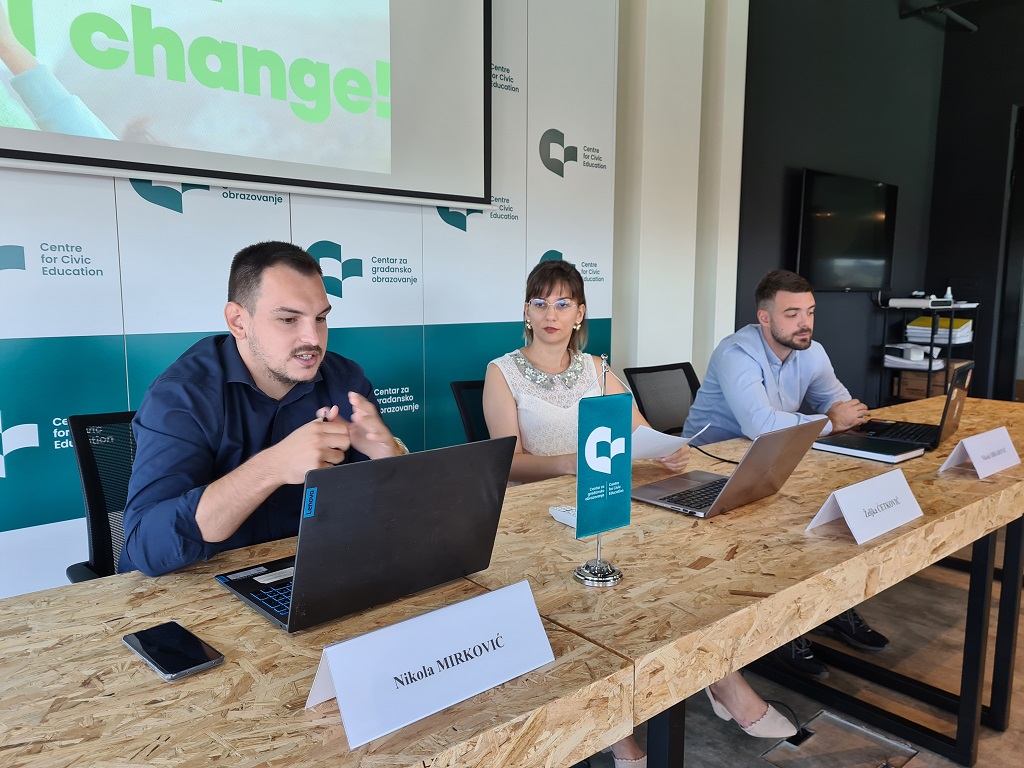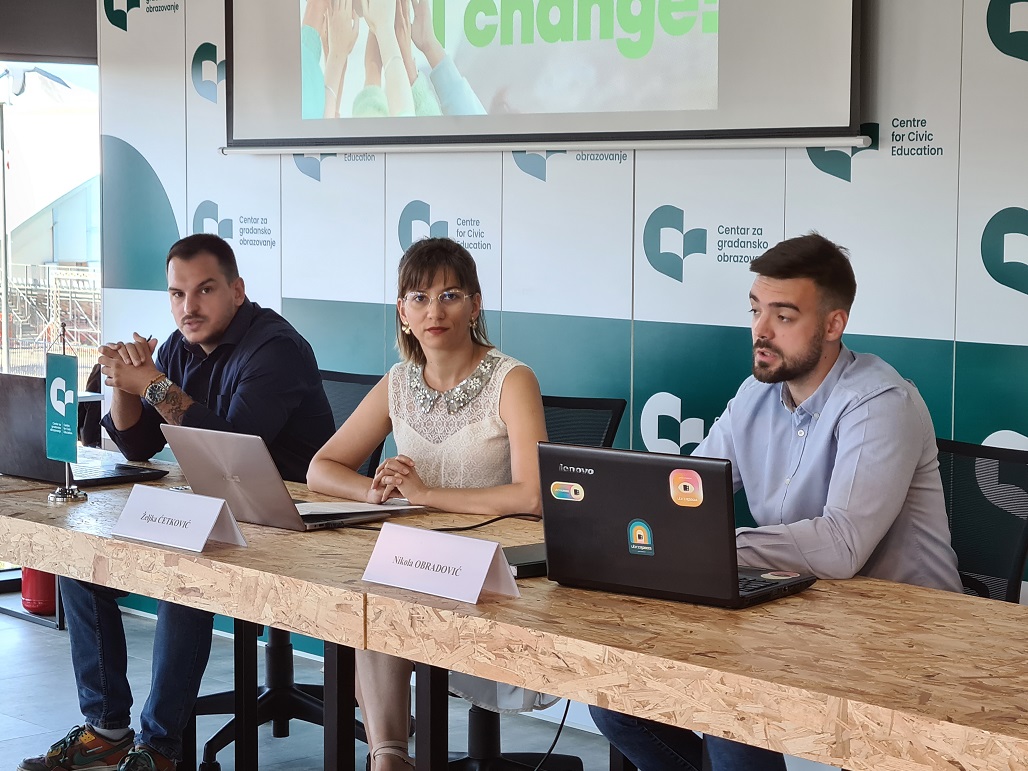Centre for Civic Education (CCE) today presented the study “Youth between marginalization, radicalization and potential” which compiles findings from empirical research and youth focus groups, along with a comparative review of previous youth research, with the aim to provide a deeper understanding of the everyday realities, experiences, and needs of young people in Montenegro. The study is part of the project “I Act – I Change!” implemented by the CCE with the support of the U.S. Embassy in Podgorica through the Democracy Commission Small Grants Program. It addresses numerous issues – from how young people spend their free time, their education and challenges regarding employment, their satisfaction with family and personal life, who they have a social distance towards, who they perceive as discriminated against and their engagement in socio-political processes. The analysis of each segment provides insights into individual challenges and broader implications. This is complemented by recommendations for improving the position of young people and the environment in which they are shaped.
“Our findings warn that continuous marginalization of young people by the competent institutions, and the neglect of youth policies cause increasing radicalization of young people, apathy, and high dissatisfaction with their position in Montenegro,” assessed Nikola Mirković, CCE Programme Associate and one of the authors.
Mirković emphasizes that at a young age, free time can be a significant factor for development of personality, which indicates whether and in what manner young people are preparing for adulthood and its challenges. “In Montenegro, young people spend most of their free time on social media, listening to music, with family or socializing with friends. On the other hand, they spend the least time volunteering in various initiatives, organizations, and activities within youth groups” he noted.
Education and employment issues are crucial in life of every young person, as two interconnected and essential categories, so the future of young people is significantly determined by their academic and professional aspects although the lack of connection between the educational process and the labour market in Montenegro remains an obstacle.
Regarding family life, young people in Montenegro tend to leave their parents’ homes relatively late. “As much as 62% of young people live with their parents, and they become independent on average at the age of 33, which is quite late when compared to European statistics although they report having a good relationship with their parents,” explained Mirković. “Personality compatibility and shared interests are crucial factors for choosing a spouse among Montenegrin youth, but religious affiliation emerges as a significant determinant, even surpassing certain other identity characteristics such as national/ethnic affiliation,” he emphasized.
“For most young people in Montenegro, independence, responsibility, loyalty (to a partner, friends, employer), and having friends are the most important values. Professional accomplishment and career come next, followed by starting a family. Good education and appearance rank in the middle, while a healthy diet and playing sports are in the second half of the priorities. Being politically active is of least importance, and engagement in civic actions or initiatives is not popular among this population,” Mirković said in reference to the youth values and life satisfaction, noting that on a scale from 1 to 10, young people themselves rate their happiness level at an average of 7.68.
“Young people express a strong social distance towards users of psychoactive substances and alcohol, HIV-Positive people, and LGBTIQ people, which indicates the presence of homophobia within this group. This significant distance from others and different ones points to serious shortcomings in the educational process, which does not deconstruct stereotypes and prejudices in a timely and adequate manner,” pointed out Nikola Obradović, projects assistant at the CCE and one of the authors, reflecting on the section on social distance and discrimination. “Over a third of young people feel somewhat discriminated against due to their political views, which has been a constant in comparison with previous research. Additionally, slightly less than a third feel discrimination based on their religion or their financial status,” Obradović indicated.
“Disinterest in politics prevails among young people, which is accompanied by the attitude that their voice does not have a significant impact on the actions of institutions. They also feel their interests are either underrepresented or not represented at all in politics. Moreover, young people have the least trust in political parties, the Government, and the Parliament of Montenegro,” Obradović said, analysing the data on youth-politics relations. “There’s a pronounced perception among Montenegrin youth that political decisions are often made without considering their perspective and specific needs,” he concluded.
The study also highlights the ongoing trend of young people’s desire to leave the country.
Furthermore, a series of findings indicate noticeable trend of re-traditionalization of the young people, starting from their highest trust in religious communities compared to other institutions/organizations in the country, their statement that religion is one of the most important factors in choosing a future spouse, belief that they would raise their children similarly to how they were raised by their parents, to the social distance towards homosexual couples and the attitude towards the issue of abortion – large number of young people today do not support abortion, while a similar number doesn’t have opinion on this issue.
“Cumulatively, this warns about the need for a systematic and comprehensive approach to addressing the challenges young people face, in order to create an encouraging environment for them to fully utilize their potential. This would contribute to sustainable inclusion and democratization of Montenegrin society,” stated Željka Ćetković, CCE Active Citizenship Programme Coordinator, who presented part of the study’s recommendations.
“Investment in education is necessary to ensure adequate resources for improving the teaching process, infrastructure, technical equipment, as well as the capacity building of teaching staff in promoting critical thinking and student engagement. Additionally, it is essential to reintroduce civic education as a compulsory subject in the formal education system, in order to systematically strengthen the critical thinking of youth and their understanding of the values of a civic society concept in Montenegro, as well as the consequences of re-traditionalization,” she said.
Regarding youth employment, it is important to ensure relevant educational programmes, which would include the skills and knowledge required in various sectors, development of internship programmes in collaboration with employers, strengthening career counselling systems, and career orientation programmes for the youth. Furthermore, there’s a recommendation for the improvement of the Professional Training for Graduates of the Government of Montenegro in line with an independent performance evaluation and user satisfaction for the previous implementation period. Also, the legal regulation of part-time work for students is suggested.
“The emphasis must also be on promoting competitiveness, transparency, and merit-based employment, creating a climate of societal unacceptability for hiring based on party affiliations and nepotism. Equally important is promoting entrepreneurial spirit with giving support for developing entrepreneurial skills among young people and launching businesses, especially in sectors that have potential for growth and employment of young people (IT, tourism, green economy, creative industries, etc.). Additionally, policies and strategies supporting youth in achieving housing independence through subsidies or favourable loans for purchasing their first homes or paying rent should be developed,” highlighted Ćetković.
The authors also emphasize the significance of developing continuous formal and informal educational programmes, as well as campaigns, so that young people better understand their role and responsibility in society’s development and the preservation of democratic values and standards, but also be encouraged to political activism.
“Creating a favourable environment for the development and unhindered functioning of NGOs is necessary to enable young people to organize themselves, express their opinions, and contribute to positive societal changes but also to be supported more effectively through NGOs dedicated to youth-related issues,” Ćetković concluded.
Opinions, findings, conclusions, or recommendations presented here are position of the authors and do not necessarily reflect the position of the U.S. State Department.
Maja Marinović, Programme Associate


